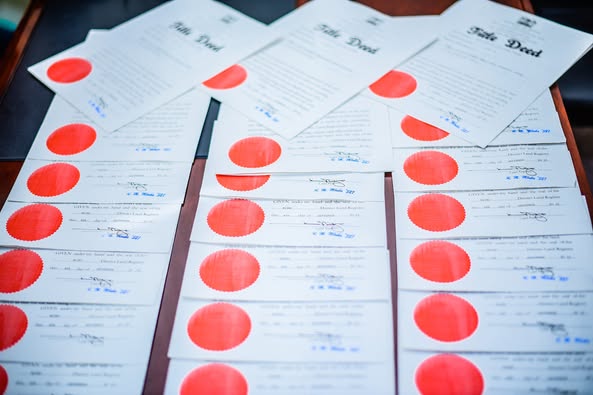What Is a Title Deed in Kenya?
A title deed is the legal document that proves ownership of land or property in Kenya. It shows the owner’s name, parcel number, size, and location of the land. Without a valid title deed, you cannot claim rightful ownership of any property in Kenya.
Whether you’re buying land, inheriting property, or investing in real estate, understanding how the title deed process works in Kenya is essential for safe and legal land ownership.
📝 Types of Title Deeds in Kenya
1. Freehold Title Deed
- Offers absolute ownership of land with no time limit.
- Mostly found in rural areas.
- Owners are not required to pay annual land rent.
2. Leasehold Title Deed
- Ownership granted for a fixed period, usually 99 years or 33 years.
- Common in urban areas or land owned by the government.
- Requires payment of annual land rent to the government.
3. Certificate of Lease
- Issued for subdivided plots under a larger lease.
- Common in housing estates or apartments on leasehold land.
- Managed by county governments or development companies.
✅ Importance of a Title Deed
- Legal Proof: Confirms the rightful owner of the land.
- Transfer Rights: Allows you to legally sell, transfer, or lease the property.
- Bank Loans: Can be used as collateral when applying for a mortgage or loan.
- Security: Protects you from fraud, disputes, or illegal claims.
Steps in the Title Deed Transfer Process in Kenya
If you’re purchasing land or property, here’s how the title deed changes hands legally:
Step 1: Conduct a Land Search
- Done at the Ministry of Lands or on eCitizen.
- Confirms:
- Current owner
- Property status
- Encumbrances or caveats (disputes, loans, restrictions)
💰 Cost: Ksh 500
📄 Required: Copy of title deed & buyer’s KRA PIN
Step 2: Get a Sale Agreement
- Drafted by a licensed advocate.
- Contains:
- Seller and buyer details
- Title number
- Agreed purchase price
- Payment terms
- Deposit amount (usually 10%)
📝 Both parties sign before payments begin.
Step 3: Apply for Land Control Board (LCB) Consent
- Required when buying agricultural land or land outside municipalities.
- Held monthly at sub-county offices.
- Both buyer and seller must attend.
🧾 Cost: Ksh 1,000
⏳ Time: 1–2 weeks (depending on schedule)
Step 4: Property Valuation
- Government valuer inspects land to determine its market value.
- Used to calculate stamp duty.
💰 Stamp Duty:
- 4% of the value (urban land)
- 2% of the value (rural land)
Step 5: Pay Stamp Duty
- Payment made via KRA iTax portal or through bank deposit.
- Payment must be completed before transfer registration.
Step 6: Complete Transfer at Ministry of Lands
Submit the following:
- Original title deed
- Stamped sale agreement
- Completed transfer forms (Form LRA1)
- KRA PINs of both buyer and seller
- Passport-size photos
- Consent from Land Control Board (if applicable)
- Payment receipts (stamp duty, registration fees)
⏱️ Transfer duration: 30 to 90 days
📄 New title deed is issued in the buyer’s name
📂 Documents Needed for Title Deed Transfer
| Document | Purpose |
|---|---|
| National ID & KRA PIN | Identity verification |
| Original title deed | Confirms land details and ownership |
| Sale agreement | Legally binds buyer and seller |
| Transfer forms (LRA1, LRA4) | Facilitates official transfer process |
| Valuation report | Determines applicable stamp duty |
| LCB Consent (if applicable) | Authorizes transfer for agricultural land |
| Proof of stamp duty payment | Confirms tax has been settled |
🔐 How to Verify a Title Deed in Kenya
Always verify a title before any purchase. Here’s how:
- Get the title deed number (usually starts with LR No. or IR No.).
- Visit the Ministry of Lands or use the eCitizen portal.
- Pay Ksh 500 for a land search.
- Receive a search result showing:
- Current owner
- Plot size
- Any cautions, encumbrances, or loans
❗ Common Title Deed Issues to Watch Out For
| Issue | How to Avoid |
|---|---|
| Fake or duplicate title deeds | Verify at Ministry of Lands |
| Encumbered land (loans, disputes) | Check search results and legal caveats |
| Unpaid land rates or rent | Confirm clearance with county government |
| Missing beacons | Hire surveyor to confirm land boundaries |
| Delayed transfer | Use experienced lawyers and follow up |
🌍 Can Foreigners Get Title Deeds in Kenya?
Yes, but with restrictions:
- Foreigners cannot own freehold land.
- Allowed to own leasehold land (up to 99 years).
- Must comply with investment regulations and get approvals if necessary.
✅ Best options: Apartments, commercial buildings, or land under corporate ownership.
📊 Freehold vs Leasehold: Key Differences
| Feature | Freehold | Leasehold |
|---|---|---|
| Ownership Duration | Indefinite | Fixed (33–99 years) |
| Common Areas | Rural lands | Urban areas and government plots |
| Land Rent | No | Yes – annual payment required |
| Transfer Process | Easier | May involve additional approvals |
🏁 Final Thoughts: Protect Your Investment with a Valid Title
A title deed is the single most important document when buying land or property in Kenya. It proves ownership, grants you the legal right to develop or sell, and shields you from fraud or disputes. Always work with a licensed lawyer, verify documents thoroughly, and never pay for land until you confirm the title is valid and transferable.
✅ Quick Checklist: Before Accepting a Title Deed
- Verified ownership through official land search
- Confirmed land size, use, and zoning
- Cross-checked seller’s ID and KRA PIN
- Confirmed no loans or disputes on the land
- Confirmed stamp duty and land rent clearance
- Title transfer registered at Ministry of Lands




